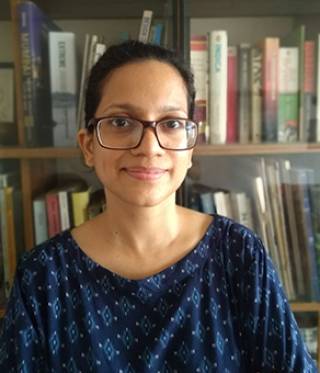Research Title
Simultaneous Inhabitation: Negotiating territory, information, and citizenship in a digitalising Bhiwandi-Nizampur (working title)
- More about Keya
Before joining this PhD program, I worked for over a decade with different non-profit organizations in India on development initiatives, collaborative research, advocacy, and institutional strengthening. Much of my work focused on supporting communities to access tenure security and improved housing and sanitation facilities, through participatory settlement mapping, digital inclusion initiatives, community-led upgrading and resettlement strategies, and examining the outcomes of national and sub-national policies.
Education
- PhD Candidate: University College London, 2023-ongoing
- Master of City Planning: University of Pennsylvania, Philadelphia, 2006-08
- Bachelor of Architecture: CEPT University, Ahmedabad, 1997-2005
Work
- Co-Convener & Research Lead (part-time): Habitat Forum (INHAF), Dec 2018-Sept 2022
- Regional Manager: India: Affordable Housing Institute, May 2017-Jan 2018
- Visiting Faculty: KRVIA School of Architecture, Mumbai, 2015-16
- Director: Bombay Studio & Projects: Urban Design Research Institute, Mumbai, May 2014-Jan 2017
- Project Coordinator: Society for the Promotion of Area Resource Centres, Oct 2009-14
- Consultant: Housing Finance Information Network, Wharton, 2008-2009
- Research Assistant: International Housing Finance Program, Wharton, 2007-2008
- Architect: Ahmedabad Heritage Cell, April 2005-May 2006
- Teaching
I am teaching/have taught as a post-graduate teaching assistant in the following modules:
- Geographies of Infrastructure (GEOG0065): 2023 Autumn Term
- MA Architecture and Historic Urban Environments, Bartlett: 2023-24
- Publications
Publications
- Kunte K. with K. Shah and Banashree B., India Country Paper on Housing: The Role of Sub-national Governments and Housing Policies, Report on Housing Policies & Practices in the Asia Region, Part 1 and 2, Asian Coalition for Housing Rights (2018)
- Kunte K., A City Built of Data and the Networked Metropolis, Mumbai Reader, Urban Design Research Institute (2017)
- Mohanty M. & Kunte K., Lessons in Inclusive Governance: Experiences of the SPARC-UDRC alliance in Odisha, Shelter, HUDCO publication, Vol.15 No.1 (April 2014)
- Patel S. & Kunte K., Working with the Invisible: Unlocking the Processes and Practices of Informal Housing, The Economy of Sustainable Construction, Ruby Press, Holcim Foundation (2013)
- Patel S. & Kunte K., Spaces of Informality: Governance and Design Choices by Slum Dwellers, S.L.U.M Lab Asian Mode, Edition 7, p.88 (2012 Spring)
- Livengood A. & Kunte K., Enabling Participatory Planning with GIS: A case study of Settlement Mapping in Cuttack, India, Environment & Urbanization, IIED, Vol. 24 No. 1, p. 77-97 (2012 April)
- Kunte K., Inclusive Urban Planning in India: Participatory Upgrading Mechanisms for the Urban Poor, City Voices, CITYNET Publication, Vol. 1 No.2, p.10-11 (2011 Winter)
Conference-Workshops
Following are some of the conferences I have had the opportunity to present at:
- Knowledge Production on Informal Settlements, Centre for Urban Equity conference, CEPT, Ahmedabad, March 2016.
- Citizenship and Public Services, Ford Foundation, Delhi, March 2015.
- Role of Grassroots in Addressing Land and Administration challenges, FIG (International Federation of Surveyors), Rome, 7-10 May 2012.
- Participatory Slum Mapping in Cuttack, India, Grassroots side panel presentation, Global Land Tool Network, UN-Habitat, Nairobi, 9-11 April 2011.
- Research Interests
My current research investigates how the changing meaning of inhabitation is navigated as digitalisation extends into processes of industry, land and property. I locate my analysis in Bhiwandi-Nizampur, a mid-sized, de-industrialising city in India situated forty kilometres outside Mumbai, which stands in contrast to its booming peripheries. Questions about inhabitation proliferate in response to the new logic of technology, not only capital. It is a nascent journey for this city, and many others in India, where high indices of deprivation and informality exist amongst its population and where infrastructures to support digitalisation are still in their early stages, intersecting in unknown ways. Constituted within these rationalities, the economic, social and spatial dimensions of inhabitation within power-loom neighbourhoods are being impacted. Yet, how this digital transition is being inhabited and how it mediates territorial struggles are not fully understood. Drawing primarily on ethnographic and grounded fieldwork, I propose to examine how an understudied but key stakeholder - power loom owners – are negotiating the ongoing transition. At stake is to make sense of how this is implicated in the future of the city, and more importantly, for whom.
Other research interests: Land & Housing politics, Digital transformations, Counter-mapping, Community-led upgrading strategies, Development policy impacts
- Grants, Prizes and Awards
- Hewlett Foundation/Provosts Travel Grant, 2007: Selected as part of a 10-student team from University of Pennsylvania to conduct a multi-case study of slum upgrading strategies in Kenya and Tanzania
- American Society of Landscape Architecture Student Collaboration Honor Award, 2008: Masters Project focusing on a Medellin Barrio, Colombia
- Funding
This PhD position is supported under a 5-year European Research Council advance grant awarded to Professor Ayona Datta on ‘Regional Futures: Digitalisation as Urbanisation’.
 Close
Close


